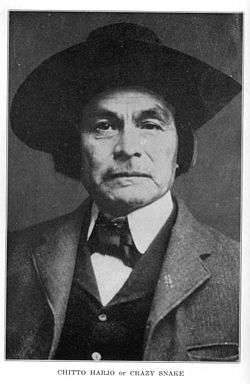Four Mothers Society
The Four Mothers Society or Four Mothers Nation is a religious, political, and traditionalist organization of Muscogee Creek, Cherokee, Choctaw and Chickasaw people, as well as the Natchez people enrolled in these tribes, in Oklahoma. It was formed as an opposition movement to the allotment policies of the Dawes Commission and various US Congressional acts in the 1890s. The society is religious in nature and opposed allotment because dividing tribal lands broke up tribal communities and resulted in "surplus" lands being seized and made available to non-Natives.
There were over 24,000 members at the organization's peak.[1]
Background

The Four Mothers Society, though it may have existing unrecognized for much of the 19th century,[2] was formally founded as a dues-collecting organization about 1895 in Sulphur Springs, and continued in this legal incarnation until 1915, and likely much later. The naming is significant as Cherokee mothers are believed to be descended from Selu, the Corn Mother;[3] it may also refer to the four directions.[2]
With the passage of the Curtis Act in 1898 and Dawes Act, allotment became US policy and the various tribal governments were forced to allot land. The fact that the existing governments broke up the land was considered an outrage by many of members of the Four Mothers Societies. Chitto Harjo set up a new Creek government in Henryetta, which was acknowledged as the legitimate government by many of the Creeks. In 1900 a meeting was held at Hickory ceremonial grounds in which Pleasant Porter and his government was declared to have violated the 1867 Creek Constitution. They declared Porter's government invalid and declared Harjo to be the new principal chief.
Redbird Smith also became involved in the Four Mothers Society.[3]
In 1906, the group submitted a petition of one hundred eighty-six signatures to Congress, so that a delegation could be sent to Washington, D.C. to discuss treaty violations and their concerns over official tribal leadership.[1] Harjo spoke before the Senate, supported by the Four Mothers Nation.[4]
The Four Mothers Society was associated with the movement for a State of Sequoyah.[2]
Besides openly opposing allotment, the Four Mothers Societies maintain ceremonial groups for stomp dances, stickball games, feasts, meetings, and ceremonies. In the late 1980s there was at least one dance ground left among the Chickasaw and another among the Cherokee.[5] Today there are several Four Mothers Society grounds throughout eastern Oklahoma.
As of 2015, there are still several Muscogee (Creek) ceremonial grounds active, and one remaining active among the Cherokee.[6]
The novels of LeAnne Howe speak of the Four Mothers Society in the context of traditional matriarchal culture,[7] and particularly deals with it in Miko Kings.[8]
See also
- Black drink
- Green corn ceremony
- Coosa
- Keetoowah Nighthawk Society
Notes
- Zissu, Erik March (2001-01-01). Blood Matters: The Five Civilized Tribes and the Search for Unity in the Twentieth Century. Psychology Press. pp. 28–29. ISBN 9780415930864.
- Johansen, Bruce Elliott (1998-01-01). The Encyclopedia of Native American Legal Tradition. Greenwood Publishing Group. pp. 98–101. ISBN 9780313301674.
- Johnston, Carolyn (2003-10-06). Cherokee Women In Crisis: Trail of Tears, Civil War, and Allotment, 1838-1907. University of Alabama Press. p. 133. ISBN 9780817350567.
- Chang, David A. (2010-01-01). The Color of the Land: Race, Nation, and the Politics of Landownership in Oklahoma, 1832-1929. Univ of North Carolina Press. p. 102. ISBN 9780807833650.
- Thomas E. Malis. The Cherokee people: the story of the Cherokees from earliest origins to contemporary times. Council Oak Books, 1992. p. 308
- "Echota Ceremonial Ground has long history in area". Cherokee Phoenix. Retrieved 2016-11-13.
- Anderson, Eric G.; Hagood, Taylor; Turner, Daniel Cross (2015-10-19). Undead Souths: The Gothic and Beyond in Southern Literature and Culture. LSU Press. p. 188. ISBN 9780807161081.
- Cox, James H.; Justice, Daniel Heath (2014-07-31). The Oxford Handbook of Indigenous American Literature. Oxford University Press. p. 404. ISBN 9780199914043.
References
- Holm, Tom. The Great Confusion in Indian Affairs: Native Americans and Whites in the Progressive Era. Austin: University of Texas Press, 2005: 25-27.